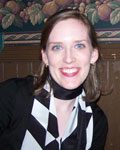2013
Catherine Cangany
- Assistant Professor
- University of Notre Dame

Abstract
This project investigates the market, commodities, producers, suppliers, vendors, and consumers of spurious merchandise in early Anglo-America. It examines three categories of common, portable counterfeits—porcelain/wampum, alcohol/medicines, and currency/silver plate—in three settings: Boston and its ties to France, New York and its ties to the Netherlands, and Charleston and its ties to Spain. In so doing, this project aims to recover part of the considerable underground economy, the portion of the commercial sector either not subject to or in violation of taxation and regulation. It reclaims forgotten commercial actors and networks and downplays the primacy of mercantilism to emphasize individualism, defined by counterfeits' propensity to subvert legal commerce for personal gain. Given that the underground economy constituted half of all economic transactions, individualism may have been the more important commercial doctrine in this period, a full century earlier than most scholarship suggests.

